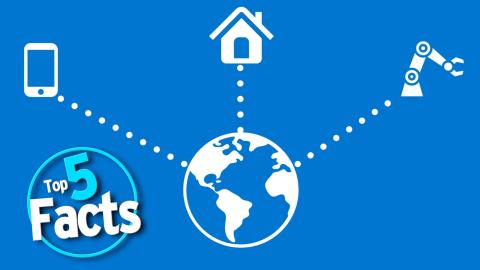Top 5 Facts about the Internet of Things

Because of the Internet of Things, more electronic devices are being connected to the Internet, and they're talking to each other behind your back. Welcome to WatchMojo's Top 5 Facts. Today, we're taking a look at the Internet of Things and how it's becoming a major part of our lives, in ways you probably didn't know.
Special thanks to our user Christo for submitting the idea using our interactive suggestion tool at http://www.WatchMojo.comsuggest
#5: The Internet of Things Is Already in Effect
The Internet of Things is an emerging technology, where machines are embedded with sensors that allow them to relay data to each other with little to no human involvement. Basically, it means all sorts of everyday items are connected to the Internet, which can completely transform the way we live. One of the earliest examples of this concept actually goes back to the early 1970s, when the ATM first went online. Some items you may already own which incorporate the Internet of Things include the Apple Watch, fit bits, and smart refrigerators. Many other items are in the midst of getting the Internet of Things treatment, like cars, buildings, and streets, which can work together in a way that helps manage traffic. So, you can thank the technology behind the Internet of Things for making your life that much easier.
#4: Big Businesses Are Already Investing Billions into the Concept
In 2008, there were officially more devices connected to the Internet than there were human beings, and by 2020, that number is expected to go up to 50 billion, according to Cisco. Tech companies see a promising future in the Internet of Things, claiming that it will make businesses more efficient. In a recent report, GE predicted that the Internet of Things will add as much as $15 trillion to the global GDP in the next 20 years, and according to projections by Business Insider, these products will outperform the tablet, PC, and phone market combined. For the time being, the largest market will be smart home technology such as thermostats made by Nest, a company Google bought for $3.2 billion. According to BI Intelligence, the IoT market is estimated to be a $490 billion market by 2019.
#3: The Internet of Things Could Save Lives
While the Internet of Things will no doubt make tech giants much richer, it might also benefit the rest of us. IoT technology could completely revolutionize patient care as well as improve communication between doctors and their patients. For example, at the University of Tokyo, researchers have created an electricity-conducting ink that can be printed on clothing, and even used to measure heart rate or muscle contractions, so people can easily monitor their own vital signs. IoT technology can also help in emergency situations. If someone has a heart attack or stroke, relevant data from the patient’s medical history can be sent to the doctor before the ambulance takes the patient to the hospital, so the doctor can figure out the best treatment possible.
#2: Wi-Fi Developments Will Make the Internet of Things Work Better
Scientists and engineers from the University of Washington have invented a new Wi-Fi system that transmits Wi-Fi at 10,000 times less power than before. Another system, PoWifi, takes power from a signal being sent and is able to turn it into a DC current. In 2010, RCA came up with a small USB device that can be powered with Wi-Fi signals so it could conceivably never run out of energy, as long as there’s a signal. So, if we could bring these technologies together, devices and appliances can be interconnected and continue to run on an energy loop powered by that same Wi-Fi. This will only make the Internet of things more efficient, and even more convenient for us.
#1: The Internet of Things Could Come with Problems
Though the Internet of Things looks like it offers countless benefits, and it does; there are also some potential security issues. For one, it gives companies more opportunities to invade our privacy. For example, there are businesses like Silverpush, which embed cookies that take information from your personal devices and sends it back to them, allowing them to keep track of which websites you visit. According to a study by Hewlett-Packard, 70% of Internet of Things devices can potentially be hacked. Kind of makes you wary of products like Logitech smart remotes or the Amazon Dash button, doesn’t it? After all, we don’t want to end up in a surveillance state where companies watch over us like Big Brother… right?
So, what do you think? Will the Internet of Things improve our lives or lead to a bleak, dystopian future? For more interconnected top 10s and invasive top 5s published every day, be sure to subscribe to WatchMojo.com.
